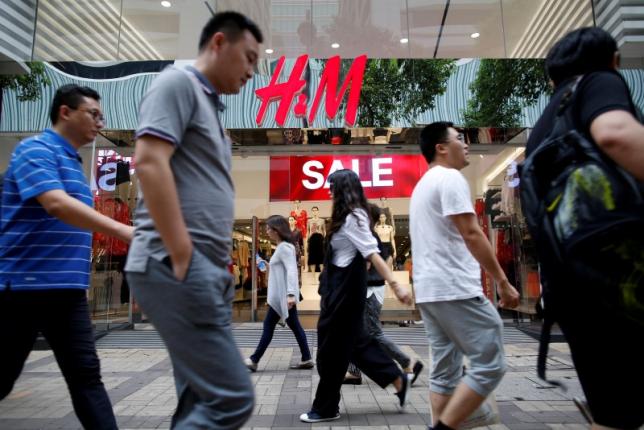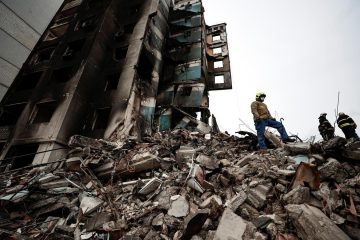Hong Kong : Makeover for prime shopping districts as luxury stores exit

HONG KONG : From fast fashion chain H&M to lifestyle brand Maison Kitsune and cosmetics firm Innisfree, mass market retailers are setting up shop in premises previously occupied by luxury brands in Hong Kong’s prime shopping districts.Aided by falling rents in top locations, accessory, sport and lifestyle retailers are emerging as a new driving force of Hong Kong’s $ 60 billion retail industry, part a major makeover the city is going through amid a slump in retail sales.
“This trend will continue,” said Joe Lin, executive director at property consultant CBRE. “We are going to see more mass market brands reappear in prime locations.”
Weak sales of luxury goods drove Hong Kong to report 15th straight monthly drop in retail sales, and the city is set to post another drop later on Tuesday when it releases June data.
Sales of jewellery, watches and valuable gifts tumbled 21 percent in January-May this year, driving a 10.8 percent fall in overall retail sales, while cosmetics and medicines posted a 2.7 percent sales decline, and furniture and fixtures reported 5.3 percent drop, the government data showed.
Luxury retail in Hong Kong exploded over the past decade as increasingly wealthy mainland Chinese flocked to the city to buy high-end Western brands, pushing out the local jewellers and other shops that once dominated the high street.
“Back in the day we only used to see (jewellers) Chow Tai Fook, Luk Fook, and pharmacies,” said Cynthia Ng, director of retail services of Colliers International.
“They (new retailers) are not necessarily local brands but tend to be cheaper in pricing and younger… Not only does the adjusted rental fit their budget, but at the same time the craze and the demand for fitness and sports are also helping them.”
Still, mass market brands might struggle to achieve the margins and profitability needed to justify prime rents in a weak retail environment, said Kevin Lai, an economist at Daiwa Capital Markets in Hong Kong.
“The luxury sector usually has much more value added,” Lai said. “So these guys may not be able to do exactly the same in terms of delivering value.”
RENT REDUCTION
Retail rents in Hong Kong’s core shopping districts, still among the world’s highest, are likely to fall another 5-8 percent in the second half of this year, bringing the full-year correction to 10-15 percent, according to CBRE.
Those declines are attracting new tenants to shops large and small.
On Russell Street in the prime Causeway Bay shopping district, the 400 square feet space jewellery group Follie Follie occupied has been replaced by footwear outlet Joy & Mario, while Swatch Group’s Jaquet Droz luxury watch shop has gone to South Korean cosmetics brand Innisfree.
Nearby, H&M opened a flagship store last year.
“For us best location is always key, and when opportunities arise, we look at the possibilities for opening new stores,” a spokesman for H&M in Stockholm said.
Sports brand Adidas last year leased a 13,000-square foot shop in the city for 22 percent less than its former occupier, Coach Inc, as the U.S. premier brand closed its four-storey flagship store in Central amid weak retail sentiment and a drop-off in tourist arrivals from mainland China.
Big shopping malls are renovating and offering attractive terms, as vacancies grow and stores on street level have also become more affordable.
Swire Properties’ Pacific Place, where British fashion house Burberry will halve the size of its store by 2017, is reshuffling its tenant mix, bringing in more food and beverage stores.
Lifestyle store Homeless recently opened a store in CityPlaza shopping mall after years of effort to secure a place in prime shopping district, and is planning to relocate its shop in Tsim Sha Tsui this year to a location with much better traffic.
FURTHER RESHUFFLE
Retail and property experts see the trend continuing as sales of luxury goods remain weak, despite steep discounts.
“In the second half of May, many brands had kicked off their summer sales much earlier than before and offering much higher discount than they normally did,” Thomson Cheng, chairman of Hong Kong Retail Management Association.
“It failed to significantly boost sales. The situation is worrying.”
In early June, French fashion house Chanel slashed prices by as much as 70 percent on selected items, while Coach cut some prices by half, in line with moves by Burberry and French luxury group Kering’s Gucci.
“The spending pattern of mainland tourists had changed and their consumption power is weakening,” Cheng said, forecasting a double digit decline in June retail sales.


